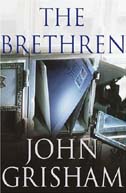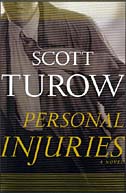|


Comment
on this story
|
|

New legal thrillers from familiar names
by Dale Bailey
Superficially, the careers of Scott Turow and John Grisham, our premier practitioners of the legal thriller, are remarkably similar. As lawyers, both novelists bring first-hand experience to their tales of jurisprudence gone awry. As writers, they have ridden parallel tracks to the top. Both published first books to public indifference—Turow's One-L, a memoir of his first year at Harvard Law School, Grisham's A Time To Kill, his now-familiar take on the grand-daddy of legal thrillers, Harper Lee's To Kill a Mockingbird. And with their second efforts—Turow's Presumed Innocent and Grisham's The Firm—both ascended abruptly to the top of the best-seller lists.
That's where the similarities end. A glance at their new novels accentuates not only striking differences in the two writers, but the degree to which both remain faithful to their original muses. Like The Firm, Grisham's The Brethren succeeds mainly on the novelty of its premise. The Firm gave us a cabal of Mafia-corrupt lawyers. The Brethren focuses on a triumvirate of crooked judges. Between settling disputes among their fellow inmates in a Federal pen, the judges hatch an ingenious blackmail scheme. Through anonymous ads in gay magazines, they coax a series of correspondents into explicit self-revelation. Faced with exposure, these deeply closeted paramours pay up, wiring increasingly large infusions of cash into the judges' foreign account.
The book's genius, however, lies in Grisham's second storyline: the CIA-orchestrated presidential campaign of Representative Aaron Lake. The judges trap Lake in their scheme just as he prepares to accept the GOP presidential nomination. From there, the book speeds through the machinations of a variety of players—Lake, the three judges, their alcoholic lawyer, and a covey of CIA agents. Indeed, events unfold with such alacrity that Grisham almost succeeds in disguising the novel's central deficit: characterization.
While Grisham deftly sketches his players, he rarely deepens the portraits. Take Aaron Lake. For the political intrigue to work, we must believe contradictory things about the presidential candidate—that he boasts a record so clean even his CIA handlers never detect scandalous potential and that he's secretly a homosexual. Grisham succeeds on the first count; as a near perfect candidate, Lake possesses almost superhuman political savvy. On the second count, however, Grisham comes up short. Lake has all the sexuality of a turnip. He's such a soulless political robot that it's difficult to believe he would engage in any politically risky behavior, hetero- or homosexual.
Precisely such a contradiction in character lies at the heart of Turow's new novel. Like Turow's previous four books—all set in Kindle County, a fictionalized Chicago realized with a depth of portraiture worthy of Faulkner—Personal Injuries deploys the conventions of the legal thriller primarily in the service of exploring character. The character in this case is Robbie Feaver, a personal injuries attorney with a terminally ill wife, a penchant for paying off judges, and lethal charm. Busted for income tax fraud, Feaver reluctantly agrees to participate in an FBI sting to ferret out yet another cadre of corrupt jurists. There's plenty of suspense in the investigation that follows, but the novel's true appeal lies in Turow's depiction of Feaver's unfolding relationship with a female FBI agent, Evon Miller.
By all rights we should dislike Feaver—a habitual liar and serial adulterer, a man so devoted to fraud that even his legal degree turns out to be a fiction. Yet he possesses an appeal that transcends charisma. An amateur actor, Feaver sees life as a "play" in which he owns the hero's role. His dishonesty arises less from an intent to deceive than from an aspiration to be a better man in a better world. Turow delivers an additional literary charge in his depiction of Agent Evon Miller. As she peels away the layers of deception to reveal the crushed idealist at Feaver's core, Miller is forced to confront her own duplicities, both as an undercover agent who must lie in order to survive and as a closeted lesbian in the rigorously conventional world of the FBI. From a master of deceit, Miller learns the nature and value of honesty.
Turow wrings both heartache and literary triumph from that ironic twist. Grisham's The Brethren, on the other hand, while enormously entertaining, fails to rise above the level of disposable fiction. It presents a world without moral complexity. Turow's Personal Injuries focuses on a landscape more like the complex one we all negotiate every day—a morally compromised universe in which we're all a little more like Robbie Feaver than we'd like to admit, saints and sinners both, just trying to make our way.

March 2, 2000 * Vol. 10, No. 9
© 2000 Metro Pulse
|